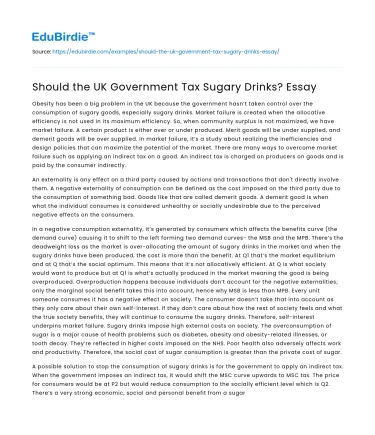Obesity has been a big problem in the UK because the government hasn’t taken control over the consumption of sugary goods, especially sugary drinks. Market failure is created when the allocative efficiency is not used in its maximum efficiency. So, when community surplus is not maximized, we have market failure. A certain product is either over or under produced. Merit goods will be under supplied, and demerit goods will be over supplied. In market failure, it’s a study about realizing the inefficiencies and design policies that can maximize the potential of the market. There are many ways to overcome market failure such as applying an indirect tax on a good. An indirect tax is charged on producers on goods and is paid by the consumer indirectly.
An externality is any effect on a third party caused by actions and transactions that don't directly involve them. A negative externality of consumption can be defined as the cost imposed on the third party due to the consumption of something bad. Goods like that are called demerit goods. A demerit good is when what the individual consumes is considered unhealthy or socially undesirable due to the perceived negative effects on the consumers.
Save your time!
We can take care of your essay
- Proper editing and formatting
- Free revision, title page, and bibliography
- Flexible prices and money-back guarantee
In a negative consumption externality, it’s generated by consumers which affects the benefits curve (the demand curve) causing it to shift to the left forming two demand curves- the MSB and the MPB. There’s the deadweight loss as the market is over-allocating the amount of sugary drinks in the market and when the sugary drinks have been produced, the cost is more than the benefit. At Q1 that’s the market equilibrium and at Q that’s the social optimum. This means that it’s not allocatively efficient. At Q is what society would want to produce but at Q1 is what’s actually produced in the market meaning the good is being overproduced. Overproduction happens because individuals don’t account for the negative externalities; only the marginal social benefit takes this into account, hence why MSB is less than MPB. Every unit someone consumes it has a negative effect on society. The consumer doesn’t take that into account as they only care about their own self-interest. If they don’t care about how the rest of society feels and what the true society benefits, they will continue to consume the sugary drinks. Therefore, self-interest underpins market failure. Sugary drinks impose high external costs on society. The overconsumption of sugar is a major cause of health problems such as diabetes, obesity and obesity-related illnesses, or tooth decay. They’re reflected in higher costs imposed on the NHS. Poor health also adversely affects work and productivity. Therefore, the social cost of sugar consumption is greater than the private cost of sugar.
A possible solution to stop the consumption of sugary drinks is for the government to apply an indirect tax. When the government imposes an indirect tax, it would shift the MSC curve upwards to MSC tax. The price for consumers would be at P2 but would reduce consumption to the socially efficient level which is Q2. There’s a very strong economic, social and personal benefit from a sugar tax. It’ll play a role in encouraging a healthier diet. At the same time raise money to deal with the rapidly rising health costs associated with obesity and excess sugar consumption. By doing this, it decreases the burden for the NHS as there would be fewer short-term illnesses in the UK. The NHS spends around £6.1bn treating obesity every year, so they would be saving money if the tax is applied. Also, this can give an opportunity for growing businesses. As the sugary drinks industry demand drops over time, there would be room to grow and promote healthier drinks which avoids the sugar tax. Although the immediate short-term impact is the loss in revenue, in the long term the business can diversify.
However, with the tax, a price raise alone will not curb consumption. With the wider range of other sugary foods available besides soft drinks, arguably the tax won’t have any effect on obesity rates at all. Also, it can be regressive, meaning it disproportionately affects low-income families so as lower income families spend a higher proportion of their income on foods and beverages, a tax will disproportionately affect them. An objective of the government is to promote equality. However, the fact that the problem of obesity is greater among low-income families, and that this increased elasticity of demand, means that they will run out of these products which justifies this regressiveness. This might not release the burden of the NHS.
Therefore, there’ll be a net welfare gain from a sugar tax with minimal economic disruption.






 Stuck on your essay?
Stuck on your essay?

